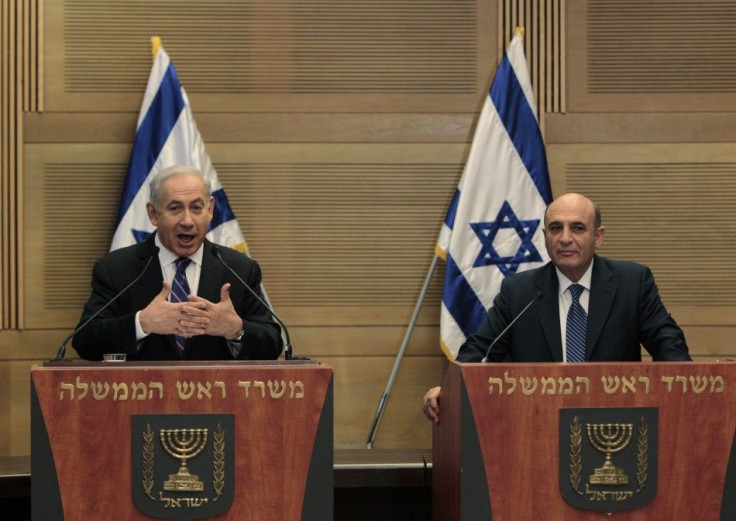Israel: Netanyahu Cancels Early Elections, Forms Unity Government With Opposition

Israeli Prime Minister Benjamin Netanyahu called off early elections with a surprise announcement early Tuesday morning that he would be forming a broad coalition government with the major opposition party, Kadima.
Netanyahu appeared with Kadima leader Shaul Mofaz at a news conference later Tuesday, announcing the unexpected alliance as members of parliament, the Knesset, were gearing up for elections expected to be held in September.
I was ready to go to elections, Netanyahu said, the Associated Press reported.
But when I learned that a very broad government can be established ... I realized that stability can be restored. That is why I have decided to form a broad national unity government.
The new coalition, which is expected to last through the end of its term in late 2013, holds 94 seats in Israel's 120-seat parliament, forming a wide alliance that will allow Netanyahu and his center-right Likud party to push through an agenda tempered by Kadima's slightly more moderate politics.
The time has come to change the agenda, said Mofaz, Haaretz reported.
This is a move of unity which is important to Israel's future. A coalition of 94 could better deal with the challenges Israel's future holds. We're here to join hands, and face the challenges, and they are not easy.
Netanyahu also announced that the new coalition would focus on four key issues: ending military draft exemptions for ultra-Orthodox Jewish religious students, passing a responsible budget, stabilizing Israel's political system in which governments are dissolved without serving out full terms and promoting a responsible peace process with the Palestinians, AP reported.
Netanyahu and Mofaz added that they would be working closely on how to deal with Iran, whose nuclear energy program is viewed by the Israeli government as a cover for developing atomic weapons -- posing an existential threat to the Jewish state. Netanyahu has said that he would authorize a pre-emptive strike on Iran's military facilities if he deems it necessary, while Mofaz -- an Iranian Jew by birth -- has supported multilateral diplomatic talks.
Abolishing the Tal Law
The Tal Law, passed in 2002, allows for special exemptions for ultra-Orthodox students from military service, which is otherwise mandatory for all Israeli Jews at age 18.
These students, known as yeshiva students, devote their studies to the traditional religious texts of Judaism.
Yeshiva students can defer military service up until age 23, when they must decide whether or not to continue their religious studies full-time, perform a shortened military service of 16 months (compared to three years for other men and two years for women) or perform a year of civil service without pay.
As of 2010, more than 60,000 yeshiva students were exempt from military service, according to the newspaper Haaretz -- a figure that represents nearly 10 percent of Israel's armed forces personnel, including regular and reserve units.
Netanyahu had already intended to change the law before announcing the Kadima alliance.
The division of the burden must be changed. What has been is not what will be, Netanyahu told a group of reserve soldiers last month, the Jewish Telegraph Agency reported.
The Tal Law will be replaced by a more egalitarian and just law, and I will submit it.
He added that replacing the law must be done without setting public against public. The change will entail expanding frameworks and increasing budgets. This is high on the list of priorities for the security of the state.
Mofaz indicated his support for replacing the law Tuesday, saying: There's a clear majority in Israel for creating an equation of [military or civil] service for all, Haaretz reported.
The new government has not yet indicated how it would enforce new military service requirements on currently exempt yeshiva students, though previous conscientious objectors have received one-year prison terms for refusing to serve.
© Copyright IBTimes 2024. All rights reserved.











